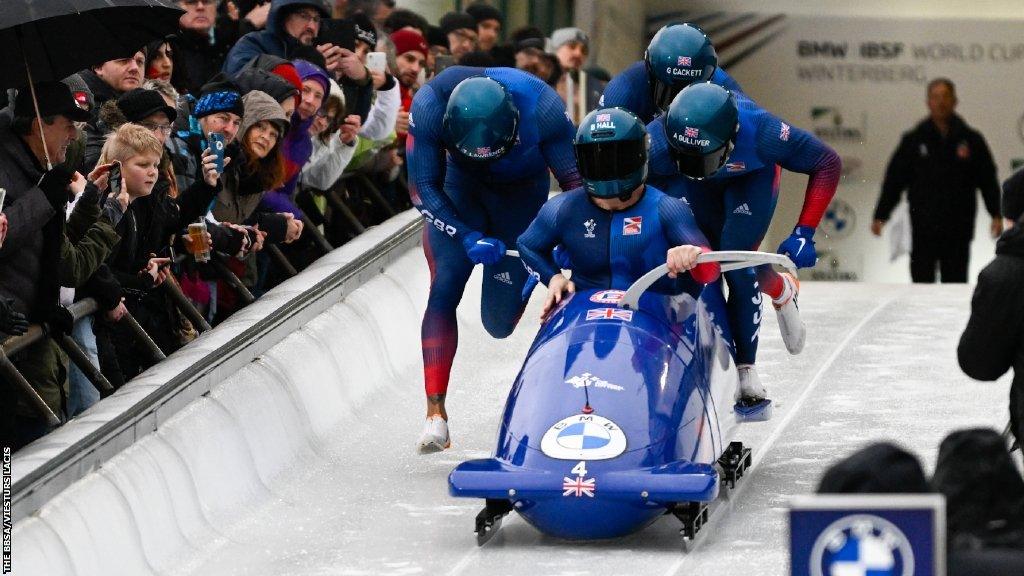Taylor Lawrence & Greg Cackett: 'Something special' coming from GB's four-man bobsleigh team
- Published

Britain's four-man team have won the European title and two rounds of the World Cup so far this season
Great Britain's four-man bobsleigh success this season is a "catalyst" for more to come over the next three years to the 2026 Winter Olympics, says team member Taylor Lawrence.
The quartet won silver at the World Championships in St Moritz last weekend, Britain's first medal in the event in 84 years.
They also won the European title and three World Cup medals this winter.
Pilot Brad Hall, Greg Cackett and Aran Gulliver make up the rest of the squad.
"This season in particular we started in Whistler, we hit the ground running and we've just been snowballing," Lawrence told BBC Radio Bristol.
"This season is the catalyst for something that is going to be very, very special over the next three years."
Lawrence said the fact that the team were "slightly disappointed" to come away with a silver medal and not gold from the World Championships was a sign of how far they had come in just the first year of the quartet racing together, with Gulliver a new recruit this summer.
"What an amazing place to be. The fact we're coming away from a world championships with a silver medal and being slightly disappointed with it," he said.
"These next three years are going to be building blocks to something very special."
'The best and easiest year'
Cackett, who has been on the bobsleigh programme since 2016, said it is "night and day" when comparing where the team was back then to now.
Great Britain finished 17th at the Winter Olympics in Pyeongchang in 2018 and sixth in Beijing last year, which helped the team secure UK Sport funding again.
New head coach Graham Richardson came in ahead of this campaign and now they are already looking ahead to winning a medal at the 2026 Games in Milan.
"This has been the best year I've ever been involved in bobsleigh," Cackett said. "It's been the easiest year and that's been born out in the results as well."
The team are due to finish their season this weekend in Innsbruck in the final round of the World Cup, where they are in the running for the overall title.
"It's not even just bobsleigh, the skeleton athletes have been doing absolutely amazingly as well," Lawrence said, pointing to Matt Weston who became skeleton world champion at the end of January.
"The programme as a whole is in a really good place and we've got a lot of exciting talent coming through in the skeleton and bobsleigh."
The British bobsleigh and skeleton teams both train at Bath University where they use the UK's only push-track to practice their starts. Yet they have to travel elsewhere to train on an ice track, which Cackett said makes their achievements even more impressive.
"We are still minnows, we don't have ice tracks, we are the perennial hermit crabs we're going around begging, borrowing, stealing runs all around the world doing our best and we always say it's a miracle we win anything," he added.
"We are now rated now as one of the world beating teams but we do also retain that lack of pressure... it's quite a nice intrinsic leveller."